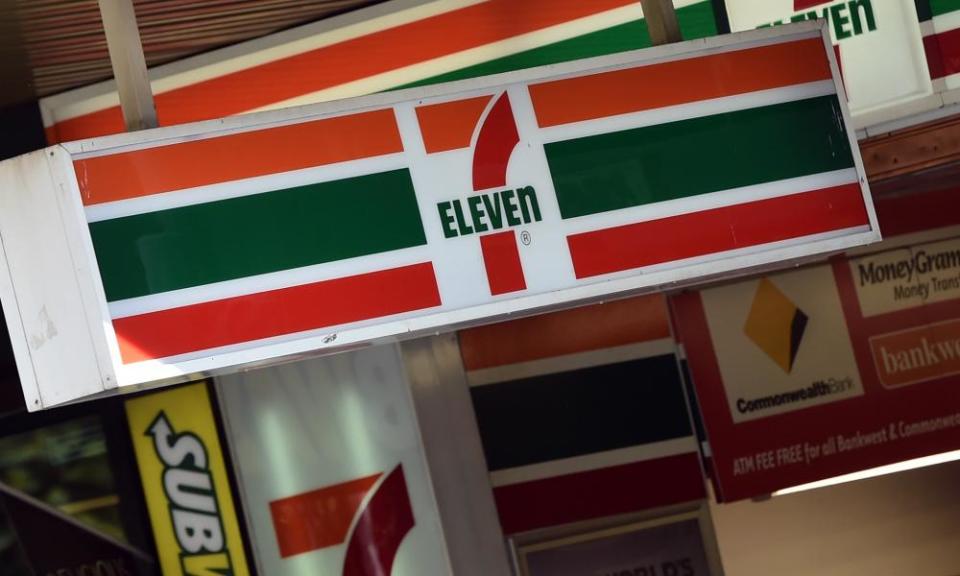7-Eleven repays $173m to workers after some franchisees falsified records in underpayments scandal

Employees of 7-Eleven franchises have been paid back $173m in underpaid wages, interest and superannuation, according to the fair work ombudsman.
The workplace regulator said on Friday that 7-Eleven had implemented payroll improvements after a report in 2016 found that some franchisees had “deliberately falsified records to disguise the underpayment of wages” and 7-Eleven had failed to detect or address the breaches.
In 2015, the ABC’s Four Corners revealed unlawful practices at 7-Eleven franchises, including systemic underpayment and instances of workers forced to withdraw their wages to pay back their employers to disguise underpayment.
Related: Wage underpayment: inquiry urges payroll solution to industrial relations 'complexity'
The reports bolstered union campaigns to expose what they call “wage theft”, which persuaded the federal government to introduce higher penalties for underpayment, including potential criminal offences for the most serious cases.
In December 2016, 7-Eleven entered a “proactive compliance deed” publicly acknowledging its responsibility for addressing past non-compliance.
In an update on compliance activity, released on Friday, the fair work ombudsman (FWO) said that between September 2015 and February 2020, 7-Eleven Stores Pty Ltd paid back $144.5m in wages, $19.5m in interest and $9.6m in superannuation.
Payments compensated 4,043 current and former franchise employees with an average payout of $21,903.96. None of the money has been recovered by head office from franchisees.
The FWO has also brought 11 litigations against 7-Eleven franchisees, resulting in courts awarding more than $1.8m in penalties for operating unlawful cash-back schemes, paying unlawful flat rates to workers, and falsifying records.
7-Eleven has implemented a biometric time-recording system, called Kronos, which mandates that franchise employees clock-on using their thumbprints.
Facial recognition of employees is used to confirm shift lengths and identify payroll anomalies. In one anonymised case study provided by the FWO, this resulted in backpay for an employee who began a shift five minutes earlier and finished one hour and six minutes later than payroll systems had recorded.
7-Eleven now uses centralised payroll systems, preventing franchisees changing workers’ rates of pay. Pay slips are also generated centrally.
The FWO, Sandra Parker, said 7-Eleven “has implemented extensive high-tech systems, training and employee assistance programs across its business”.
“Through our compliance partnership, the franchisor has delivered on its commitment to address past breaches by its franchisees and lead a network that meets its lawful obligations to workers,” she said.
“We will continue to monitor compliance in 7-Eleven outlets and encourage head office to consider entering into a second compliance partnership to ensure ongoing accountability.”
The 7-Eleven chief executive, Angus McKay, welcomed the release of the FWO report.
“I said we would be accountable for our actions and take ownership of our remediation journey,” he said. “I truly believe we have done just that and will continue to do so. We remain absolutely committed to ensuring continued compliance with all workplace laws and regulations across our Australian network.”
In 2017, the Coalition introduced laws to increase the maximum civil penalties for serious contraventions of the Fair Work Act.
Franchisors and holding companies are now responsible for contraventions by their franchisees or subsidiaries where they knew or ought reasonably to have known of the contraventions and failed to take reasonable steps to prevent them.
Related: Deal between big business and Australian unions sparks fury from employer groups
In September 2019, the attorney general and industrial relations minister, Christian Porter, began consultation for possible new criminal penalties for deliberate and systemic underpayment.
After the outbreak of Covid-19, consultation on the issue was moved to roundtables conducted between unions and employers, from which Porter is expecting to produce an industrial relations reform bill before the end of 2020.
The Australian Council of Trade Unions secretary, Sally McManus, has said she is concerned the reforms could cut workers pay and conditions. But one area of consensus was that unions had agreed the government should subsidise small businesses’ access to payroll software to improve compliance with pay laws.
There was also “95% agreement” on a simpler and faster system to correct wage underpayments, allowing employers to agree in the Fair Work Commission to pay money back in return for protection from civil penalties in court proceedings, she told Guardian Australia earlier in October.

 Yahoo News
Yahoo News 